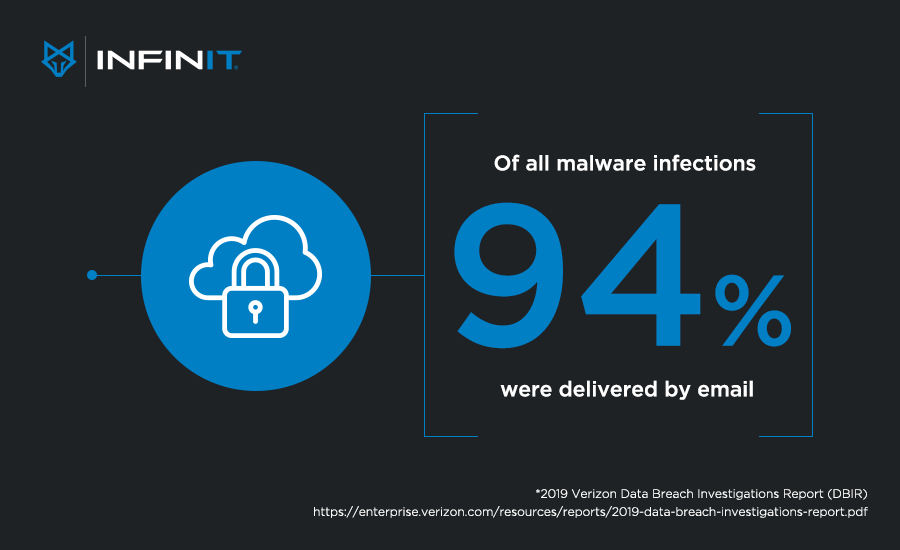Cyberattacks are becoming more dangerous every day. Despite efforts by security companies to come up with new ways to counter them and protect sensitive data, many individuals and businesses still succumb to threats such as malware, phishing, and denial-of-service (DoS) attacks.
Let’s take a look at the top five most alarming cybersecurity statistics this 2019:
#1. 43% of cyberattacks target small businesses
According to the 2019 Verizon Data Breach Investigations Report (DBIR), almost half of small businesses are vulnerable to cyberattacks. Cybercriminals are attacking small- to medium-sized businesses (SMBs) due to the latter’s complacent mindset towards cybersecurity. SMBs believe they have nothing of value for a hacker to steal, so network security is often a low priority.
Employees might also have poor security habits such as using weak passwords, unmindfully opening unknown links and sketchy email attachments, and plugging in personal USB flash drives. And because SMBs are doorways to larger enterprises, hackers take advantage of the negligence and poor network security of the former to steal the confidential files of the latter.
Remember that businesses of all sizes are at risk, so SMBs will need to invest in effective security solutions to protect their data and stay safe online.
#2. 94% of malware is delivered by email
Verizon’s 2019 cybersecurity report found that 9 in 10 malware infections were delivered to victims via email in 2018. The most commonly used files for concealing malware were Microsoft Office documents and Windows executables.

Cybercriminals are using email as an attack vector because they are aware that many businesses communicate via email. And when they successfully infect systems with malware, they can easily steal important files and conduct phishing attacks.
Teach your employees to be careful about opening email attachments. Some attachments can look like harmless documents but are booby-trapped with malware.
#3. Cyberattacks cost small companies $200,000 on average
Modern IT infrastructures are becoming more complex and sophisticated, which means that SMBs have more ground to cover cybersecurity-wise. From desktops to mobile devices, organizations need to keep up with the growing cybersecurity landscape.
According to insurance carrier Hiscox, digital incidents now cost small businesses $200,000 on average. This is a nearly six-fold increase, compared to $34,000 in 2018. To make things worse, 60% of them go out of business within six months of being victimized.
The frequency of attacks is also increasing, with more than half of SMBs having suffered a data breach within the last year, and 4 in 10 having experienced multiple incidents.
One key takeaway is that everyone in your company is responsible for protecting intellectual and professional data. Another key takeaway is that small businesses should take cybersecurity more seriously. Large enterprises have the ability to spend on data recovery efforts, while smaller organizations might not, which could shut the latter down forever.
Get a FREE Security Assessment
Find out how your defenses fare against cyberthreats and identify vulnerabilities in your IT environment.
#4. Human error remains to be the top cybersecurity concern for executives
As humans, we all make mistakes. In fact, according to a study by Oracle, humans are seen as the biggest vulnerability by C-Suite executives and policymakers. This means that your cybersecurity measures must factor in how error-prone people can be.
To mitigate the effects of human error on your cybersecurity, devote time to training people to identify cyberattack methods like hoax emails. Keep your employees updated on new ways cybercriminals can attack your business, so they will know in case they figure in a similar incident.
Invest in security-advancing technology that has the ability to significantly minimize or eliminate human error entirely, such as artificial intelligence (AI) and machine learning (ML).
#5. Organizations will spend $21 billion on managed IT services
Some organizations continue to struggle to maintain their own in-house security solutions and staff. As a result, companies will spend $21 billion on managed IT services providers (MSPs) for round-the-clock security monitoring and managing security operations centers, according to market intelligence firm IDC.
MSPs such as INFINIT Consulting maintain the security of SMBs’ IT infrastructures. A professional outsourced team will ensure that a company’s systems are fully optimized and that cyberattacks are taken care of before they do major damage. The best part about hiring an MSP? It costs less than the salary of a full-time IT employee.
Don’t be another data breach statistic. By having ERGOS handle your IT infrastructure, you are ensured of proactive technology management and 24/7 on-demand support that will allow you to focus on the things that matter more in your business. See what we can do for your company by claiming your FREE IT assessment today.


